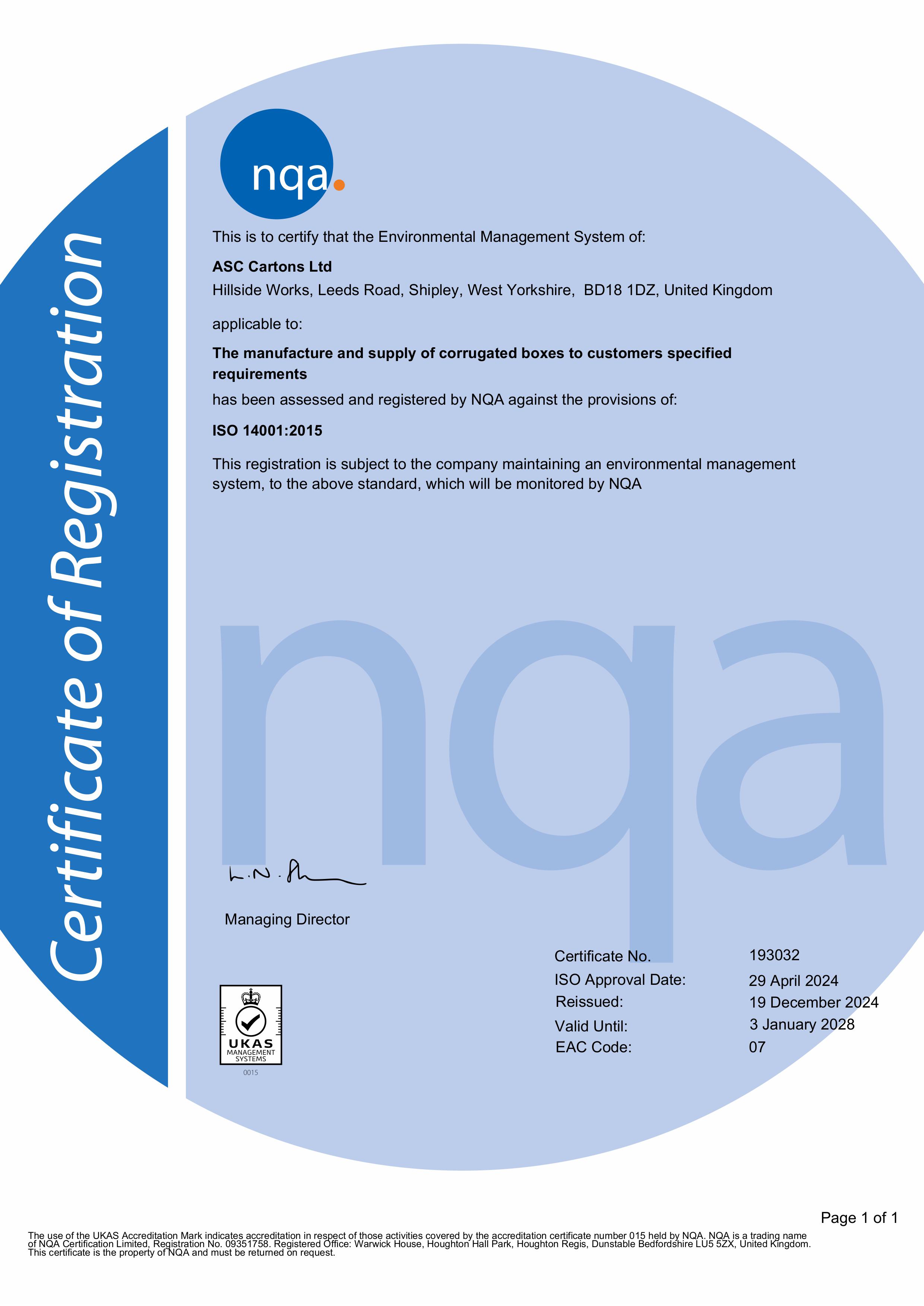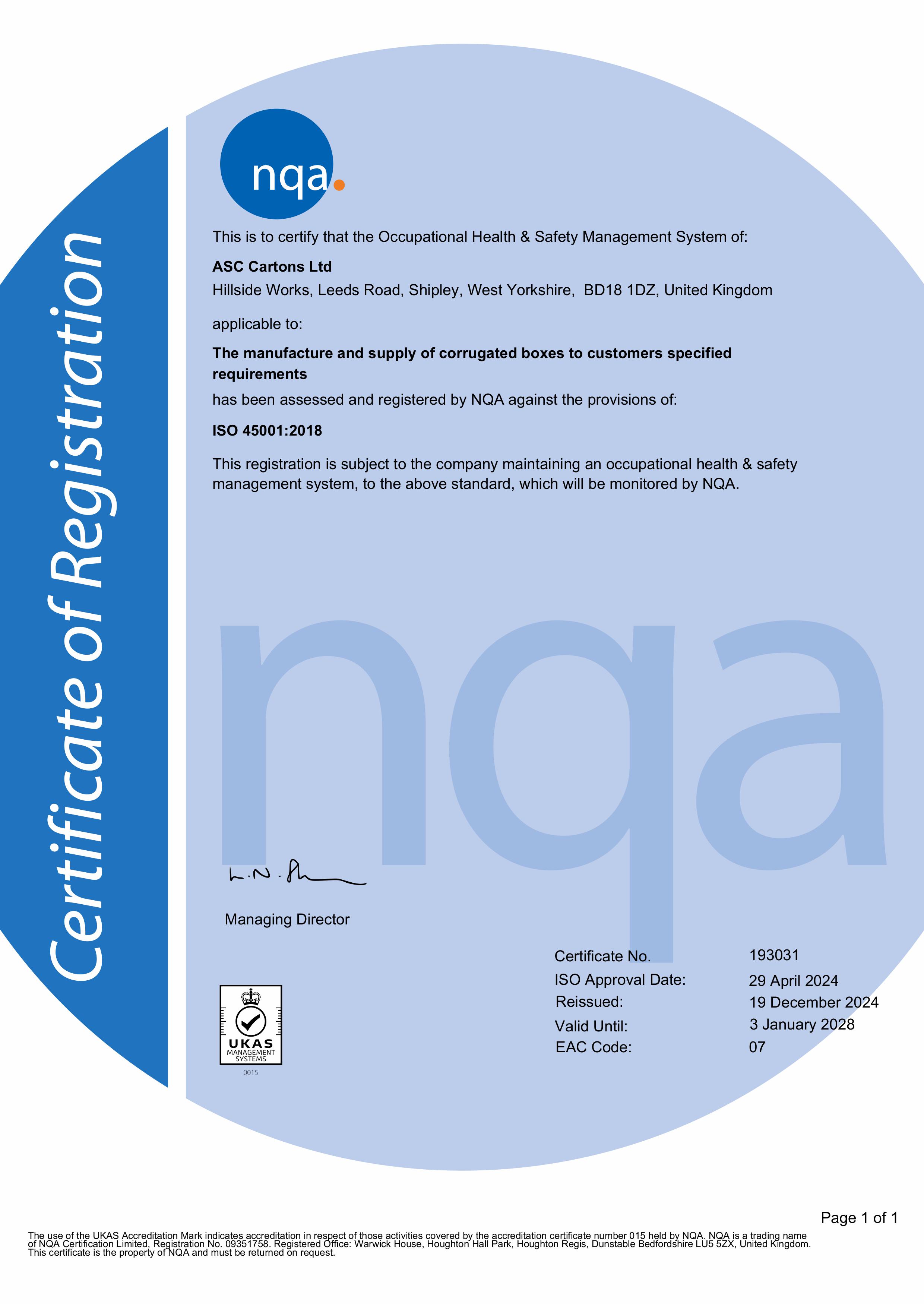The Importance of Being Recertified to ISO 9001, ISO 14001, and ISO 45001
7th Jan 2025
In today’s competitive market, achieving and maintaining ISO certifications, like ISO 9001, ISO 14001, and ISO 45001 is not just a box-ticking exercise; it’s a necessity. For ASC Direct, these certifications ensure we maintain our internal quality and sustainability standards and help us to show customers that we’re serious about driving long-term growth. ISO certification is a seal of approval from a third party body, in our case NQA, that confirms we continue to meet the requirements of the international standards developed and published by the International Organisation for Standardisation (ISO).
What are ISO 9001, ISO 14001 and ISO 45001?
For ASC Direct, our recertifications are for:
ISO 9001 - Quality Management Systems (QMS), consistently meeting customer and regulatory requirements while enhancing customer satisfaction.
ISO 14001 - Environmental Management Systems (EMS), promoting practices that minimise environmental impact.
ISO 45001 - Occupational Health and Safety (OH&S), creating safer workplaces and reducing workplace risks.

Together, these establish a robust framework that supports our operational excellence.
Relevance of Recertification
Maintaining ISO certifications is not a one-time achievement. Regular recertification ensures that we continually adhere to evolving standards, stay compliant with regulatory updates, and adapt to new market demands. It is important to note that the benefits of recertification extend far beyond compliance:
- Customer Confidence Recertification sends a clear message to customers that the company is committed to maintaining high standards in quality, environmental management, and employee safety. Many clients, especially large retailers and multinational corporations, prioritise or even require suppliers with ISO certifications. Being recertified can be the difference between winning and losing key contracts.
- Operational Efficiency The processes involved in maintaining and recertifying ISO certifications encourage companies to identify inefficiencies and optimise operations. For instance, ISO 9001’s focus on continuous improvement can help streamline production, reduce waste, and improve lead times—all of which contribute to cost savings.
- Environmental Stewardship With sustainability becoming a critical factor for customers and regulators alike, ISO 14001 recertification demonstrates a proactive approach to reducing environmental impact. This helps companies to highlight efforts such as using recycled materials, minimising emissions, and responsibly managing waste—practices that resonate with environmentally conscious consumers.
- Workplace Safety and Culture ISO 45001 recertification underscores a company’s dedication to protecting employees. By systematically addressing health and safety risks, companies can reduce accidents, enhance employee morale, and improve retention. A safe working environment also enhances productivity, as employees feel more secure and valued.
- Regulatory Compliance The UK’s regulatory landscape is constantly evolving, particularly concerning environmental and safety standards. Recertification helps companies stay ahead of these changes, reducing the risk of non-compliance, penalties, and reputational damage.
- Market Differentiation In a crowded market, ISO certifications are a powerful differentiator. Recertification proves to stakeholders that the company is actively striving for excellence. This commitment can strengthen brand reputation and open doors to new business opportunities.
Challenges and Solutions
While the recertification process requires effort and investment, the long-term benefits far outweigh the challenges. To simplify the process, companies can:
- Conduct regular internal audits to ensure ongoing compliance.
- Engage employees at all levels to embed ISO principles into the company culture.
- Work with experienced consultants or certification bodies for guidance and support.
For ASC Direct, being recertified to ISO 9001, ISO 14001, and ISO 45001 is not merely a formality—it’s a strategic imperative. These certifications enhance credibility, drive operational improvements, and align our business with the expectations of customers, employees, and regulators. In an industry that values reliability, sustainability, and safety, recertification is a cornerstone of long-term success.




